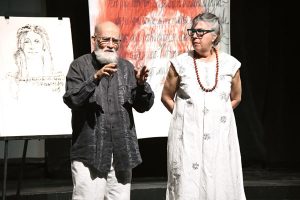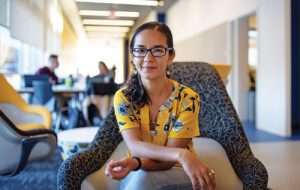
A house in Toa Baja, Puerto Rico, bears the markings of floodwaters after Hurricane Maria ravaged the island in September 2017. Photo: Erika P. Rodríguez
Campus community lends support to Puerto Rico
By Andrew J. Concatelli
While the destructive impact of Hurricanes Irma and Maria on Puerto Rico last fall could be seen in the images of the island’s flooded streets, battered palm trees, downed wires, and flattened houses, the devastation could be felt thousands of miles away in Hartford, where about 35 percent of the city’s population identifies as Puerto Rican. Moved by many personal, professional, and neighborly connections, the Trinity College community took action by offering assistance to students, scholars, and others affected by the storms.
“Trinity is one of the largest institutions in a city where one of the largest populations happens to be from Puerto Rico,” says Trinity Professor of Fine Arts Pablo Delano, who was born in the island’s capital city of San Juan. “Given a tragic event like this, we applied the particular strength of this institution—which is education—by doing things like supporting students and hosting visiting scholars.”

Antonio Martorell and Rosa Luisa Márquez, both from Puerto Rico, present the Language and Culture Studies Distinguished Scholar Lecture in March 2018.
Photo: John Atashian
The Trinity College for Puerto Rico (TCforPR) fund quickly received contributions from the offices of President Joanne Berger-Sweeney and Dean of the Faculty Tim Cresswell, as well as from many academic departments, faculty members, staff members, students, and alumni. With those funds, Trinity has hosted visiting scholars and students from Puerto Rico over the past several months and continues to support the affected communities through outreach programs in Hartford and a planned service trip to the island.
SUPPORT FOR SCHOLARS
The TCforPR fund has made it possible for Trinity to host five visiting scholars from Puerto Rico, with weeklong residencies featuring public talks and workshops for students.

Photojournalist Erika P. Rodríguez, who is based in Puerto Rico, pauses before speaking to a digital photography class during her February visit to campus. Photo: Monica Jorge
One visiting scholar, Erika P. Rodríguez, a photojournalist based in San Juan whose work has appeared in publications including The Washington Post and The New York Times, met with students and participated in a public talk called “Picturing Maria: The Wrath and Aftermath of a Hurricane,” alongside Delano and Hartford Courant photographer Patrick Raycraft. Rodríguez shared some of her own memories and powerful photos, including the one at the top of this web page. Delano says, “When the storm hit, her apartment was damaged and she couldn’t live in it. She ended up living in the newsroom of a paper where she sometimes worked, going out to photograph and coming back and sleeping on a cot. She was photographing not only her homeland but her personal experience.”
Dean of Academic Affairs and Professor of Language and Culture Studies Anne Lambright says that Trinity wanted to support scholars who may have faced similar difficulties. “Many scholars lost their labs or their libraries in the hurricanes. It is a very difficult environment in which to continue researching or teaching,” she says. “With short-term residencies, scholars could come here and use lab space or use our library, engage with other scholars and students, and start thinking about possibilities for the future.”
SUPPORT FOR STUDENTS
Trinity is one of many colleges to open its doors to students from the University of Puerto Rico (UPR) as the island continues to recover. According to Lambright, this “guest semester” model was developed by Tulane University, whose students were taken in by other institutions after Hurricane Katrina ravaged New Orleans in 2005. “Students pay tuition to the University of Puerto Rico and come to study here free of charge as special students,” Lambright says. “The university will accept the courses that the students take here as transfer credits, and they go back and complete their degrees. Without this support, they might not be able to graduate in a timely manner.”
Vice President for Enrollment and Student Success Angel B. Pérez says that the application process was made as simple as possible. “We realized students may not have access to official transcripts, since many offices there were closed. The question we asked was, ‘Why do you want to come to Trinity?’ ”
To Pérez, who is from Puerto Rico and has family living there, Trinity’s support of the Puerto Rican community is quite meaningful. “This continues to bring to life Trinity’s mission of engagement and connection. We are dedicated to this community, and if we have the resources to do something, we have a moral obligation to do it,” he says.

Rocío V. Santos de Jesús and Agnes M. Torres Rivera, two graduate students from Puerto Rico, study together at Trinity.
Photo: Nick Caito
Two graduate students and one undergraduate from UPR attended Trinity as visiting students this spring. While classes at UPR resumed by late fall 2017, some students still faced significant challenges. Graduate student Agnes M. Torres Rivera said it was difficult to find Internet connections in Puerto Rico. “The school had electricity, but the library was closed—the books were wet and moldy,” she says. She and fellow social community psychology graduate student Rocío V. Santos de Jesús decided to continue their studies in Hartford. “For me, this has been a really great experience because I’ve met a lot of people from a lot of different backgrounds,” Torres Rivera says. “The college has been really helpful in meeting all of our needs. I think I’ll be able to finish my thesis.”
SUPPORT FOR CITIZENS
In the immediate aftermath of the hurricanes, student organizations including La Voz Latina (LVL) held fundraisers on campus, and donations were collected during Trinity’s annual Christmas Festival of Lessons and Carols. Those who could not contribute monetarily helped in other ways, such as through a drive to collect winter clothing for families who had relocated to Connecticut from Puerto Rico. As relief efforts were under way, a “mapathon” held in Trinity’s Raether Library and Information Technology Center used open-source mapping to provide local aid groups with detailed information about areas that suffered significant damage.

La Voz Latina members Giana Moreno ’20 and Posse Scholar Neve Rivera ’20 seek donations during Trinity’s 2017 Homecoming to help those in Puerto Rico and Mexico affected by recent natural disasters
Photo: Amanda Lafferty ’21
Torres Rivera and Santos de Jesús joined in Trinity’s efforts to support the hundreds of people from Puerto Rico who came to Hartford after the hurricanes, many of them living in hotels. “We met with them to help look for and apply for jobs on the computer, translate their resumes that were in Spanish, and role play interviews with them,” Torres Rivera says. They also met with Hartford Councilwoman Wildaliz Bermudez ’04 to organize more local efforts in which Trinity students could get involved.
Carol T. Correa de Best, associate director of Trinity’s Office of Multicultural Affairs, says that it is important for Trinity to support its neighbors in need. “While we help them grow and stabilize, we also become stronger as an institution,” she says. “We want people to not see differences as hindrances, but as positives that can bring us closer.”
Torres Rivera and Santos de Jesús worked with Trinity students to plan a service trip to Puerto Rico set for June. The itinerary calls for a group of about 25 students, staff, and faculty members to work with the elderly, tutor children, and help prepare schools to reopen. Torres Rivera says that she admires the Trinity students who want to do whatever they can to help. “It shows that they really care about the Puerto Rican community,” she says. “They’re really interested in going there to do something good.”
Lambright says that the TCforPR fund will continue to raise money for Trinity’s efforts to assist scholars, students, and citizens from Puerto Rico. “This is something that we feel is essential given the deeply Puerto Rican character of Hartford and the city’s Puerto Rican population,” she says. “The recovery is going to take years, and we’d like to see this as the beginning of a sustainable connection.”
On campus
Photojournalist Erika P. Rodríguez worked with students and took part in a panel discussion called “Picturing Maria: The Wrath and Aftermath of a Hurricane” with Hartford Courant photographer Patrick Raycraft and Trinity Professor of Fine Arts Pablo Delano.
Maritza Stanchich, a professor of English at the University of Puerto Rico, gave a talk called “Natural and Artificial Disasters Decades in the Making: Puerto Rico as Exemplary” and met with students, classes, and other groups.
Juan Angel Giusti Cordero, a history professor from the University of Puerto Rico, visited with classes and delivered a lecture titled “Rethinking Maria: Notes on Puerto Rico’s Hurricane History since 1825.”
Rosa Luisa Márquez, a professor and theater director from the University of Puerto Rico, and Antonio Martorell, a Puerto Rican visual artist and performer, jointly presented this year’s Language and Culture Studies Distinguished Scholar Lecture, “To Play Is the Thing! Jugando Mamá, Jugando … .” They also conducted a theater workshop with students and participated in a panel discussion that addressed creating art in Puerto Rico after Hurricane Maria.
Anyone wishing to make a tax-deductible contribution to the TCforPR fund may do so by calling Trinity’s 24-hour gift line at 1-800-771-6184 or by going to the Trinity College online donation form and following these instructions: Select “I want to target my impact”; in the pop-up window, check the “Other” box and press “Continue”; and in the “Other Designations” field, type “Trinity for Puerto Rico.”

